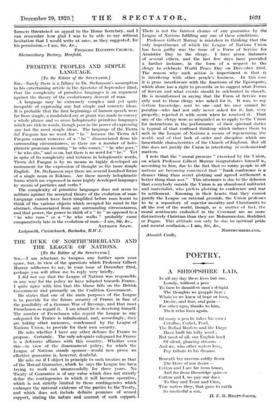PRIMITIVE PEOPLES AND SLMPLE LANGUAGE.
[To the Editor of the SPECTATOR.] SIR, —Surely there is a fallacy in Dr. Stefansson's assumption 'in his entertaining article in the Spectator of September 22nd, that the complexity of primitive languages is an argument against the theory of the evolutionary descent of man. A language may be extremely complex and yet quite incapable of expressing any but simple and concrete ideas. It is probable that the first beginnings of human speech were far from simple, a modulated cry or grunt was made to convey a whole phrase and so arose holophrastic primitive languages which are rich in words, though poor in the power of expressing any but the most simple ideas. The language of the Tierra del Fuegans has no word for " he " because the Tierra del Fuegans cannot conceive of a " he " disassociated from his surrounding circumstances, so there are a number of holo- phrastic pronouns meaning " he who comes," " he who goes," " he who sits," and so on, but there is no word for " he." Yet in spite of its complexity and richness in holophrastic words, Tierra del Fuegan is by no means as highly developed an instrument for the expression of thought as the more simple English. Dr. Stefansson says there are several hundred forms of a single noun in • Eskimo. Are these merely holophrastic forms which are expressed in more highly developed languages by means of particles and verbs ?
The complexity of primitive languages does not seem to militate against the accepted theory of the evolution of man. Language cannot have been simplified before man learnt to think of the various objects which occupied his mind in the abstract, disassociated from any surrounding circumstances, and that power, the power to think of a " he " as opposed to a " he who runs " or a " he who walks " probably came comparatively late in the evolution of man.—I am, Sir, &c.,
ANTHONY SHAW.
Ladysmith, Christchurch, Barbados, BM .1 .


































 Previous page
Previous page